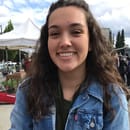I’m about two months away from graduating college with a bachelor’s degree in creative writing. I’m in my capstone class, where we’re doing a lot of reflecting and conversing about the past four years. Since quarantine started, of course I’ve been bummed that I can’t be in Seattle with my friends. Senior year, not being able to see my English peers, has, to put it plainly, sucked. Connecting together through class is nice, but it’s especially rough to hear my peers talk about their experiences with people telling them that their major is a waste of time. I’ve heard it too—what English major hasn’t?—but it’s different when we aren’t together in person to talk about it. Sometimes, it’s hard to remember how excited I used to get to be in the same room with people who are as passionate about English as I am. In sitting with that, I’m thinking a lot about the decisions I made to get me here. Sure, English majors get teased probably more than any other major, but if I could go back and start again, I wouldn’t change a thing.
My senior year of high school, two of my teachers gave me advice that changed my life. The first came from my film teacher, Mr. Davis. The advice was situational: go to college in an exciting place, somewhere that will fuel your creativity. I was trying to figure out what I would major in, and creative writing was one of the ideas on the table. When I told Davis I was thinking of applying to Washington State University, he laughed a little and said, “Why? Pullman’s in the middle of fucking nowhere.” Davis was pushing me to major or minor in film and become a director. He said there aren’t enough women directors in the business and he thought I had enough talent that I could make it and work towards changing that. But in reality, he wanted me to follow my dreams and do something that would make me happy.
The second piece of advice is something I think of often. Mrs. Bhowmik was the first ever creative writing teacher I had. I hadn’t gotten the chance to take a class until my senior year of high school—not that it mattered. I started writing short stories when I was nine years old. I took her class for fun, because I had an open spot in my schedule. She encouraged me to write as much as I could, never giving me a word limit, always promising she would read whatever I wrote, even if it took a little while. Every Thursday, my high school had “college day” where we were supposed to wear merch from different universities. After November, whenever I would come into class wearing clothing from San Francisco State University or Seattle University, Mrs. Bhowmik would get so excited and asked if I had committed to that school. One day, I went to her classroom during our break and asked her for advice on my major. I had found a couple schools that offered creative writing majors, but it seemed so impractical. I told her what I was thinking, and at the end I said, “I think I’ll just major in history.”
Mrs. Bhowmik said, “Do whatever you want, but the word ‘just’ should never be a word you use when you talk about your future.”
And like that, I had a major. My parents were supportive before I even told them. Like I said, I’ve been writing since I was nine years old; I’m 22 now. That’s thirteen years of my life I’ve devoted to my craft. In those thirteen years, I’ve written four novels, countless short stories, and even a couple film scripts. For the first novel I ever wrote, I googled “creative writing majors in Seattle,” needing a university to send my protagonist. She went to Seattle University; four years later, I did the same.
My parents and friends have been supportive of my major from day one, but that doesn’t mean it’s been all butterflies and rainbows. Part of the difficulty has been from other people, and the poor perceptions of my major. My first English advisor, the head of the creative writing department, told me I should wait until my junior year to take major specific classes because if I changed my mind, at least all my gen eds would be out of the way. When my neighbor asked what I was studying the first time I came home from college, I told him, and he said, “Don’t worry, you’ll figure it out.”

So here I am, four years later, two months away from graduating with a bachelors of arts in English creative writing. I’m as happy as I’ve ever been with my major, but listening to some of my peers reflect on the last four years, not everyone can say the same. Every English major is ridiculed at some point; how deeply we internalize it depends on the person. I hate hearing other English majors say they actively regret or at one point regretted their major—it’s upsetting and disappointing. I don’t think anyone goes into English without having a real passion for literature or creative writing. When I think about my goals for my future in creative writing, a lot of them involve disturbing or doing away with the literary canon we learn in schools. I work towards that with every novel I write. I know my peers will play a massive role in helping shift what we study and look to as the “classics,” as well as books that deserve to be taught in classrooms. While I love hearing about all the different plans my peers have, it’s exciting to know we’re all working towards a similar goal.
This is a weird article to write. I started it on a day where my capstone class was talking about our fears and hopes for our future, and I left the class with a lot of big feelings. I guess I’m trying to say that no matter how “impractical” a major seems, if it’s something you love, it’s worth it. Capitalism is the root of all evil and contributes to nearly every issue we collectively face. I think a lot of people hear that I (or anyone, really) am majoring in creative writing, and they assume we’ll live a starving artist life, chasing dreams that will never come to fruition. I don’t think those people realize how much books can mean to people. If I can write a book that will touch someone’s heart, something they can see themselves in, something they can recommend to a friend and tell them how much they loved it, it’ll all be worth it to me. Every time I finish a chapter, I feel confident in my ability to make that a reality. And maybe being an author won’t be my full-time gig, but I can make damn sure wherever I end up, I’m fueling my creative spirit and continuing to write.



